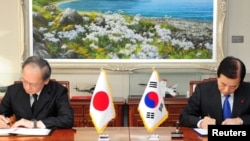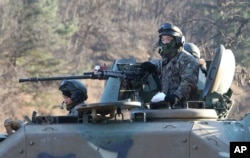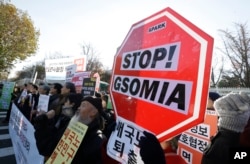An intelligence-sharing deal between South Korea and Japan allows the two countries to bypass the United States as they work together to combat the growing threat of North Korea's nuclear and missile programs.
The deal was signed last week and went into effect immediately.
Rodger Baker, vice president of strategic analysis at Stratfor, a geopolitical intelligence provider in Austin, Texas, said the deal gave the two countries "a capability to share in real time information that normally would have had to pass through the United States and only been partially parsed off to each of them."
Harry Kazianis, director of defense studies at the Center for the National Interest, a Washington public policy think tank, went a step further, calling the pact a "game changer."
"Having the capability to share intelligence as quickly as possible, hopefully with the speed of an internet connection and a computer, would truly be a game changer in getting rid of Washington [to] not be the middleman anymore."
Different abilities
Baker said the two countries bring different abilities to the table: South Korea may be better at human intelligence collection, and Japan may be better at satellite imagery.
Kazianis also pointed to the timeliness of the agreement, reached in late November, as the U.N. Security Council passed additional sanctions against North Korea related to its trade practices.
"Look to see in the next, probably, few months," Kazianis said, "the North Koreans … pushing up tensions to try to get the sanctions lifted or eased or whatever they can do to get that minimized." In the next couple of months, he said, "tough times in the Korean Peninsula could become very dangerous."
In Seoul, Yonsei University's Choi Jong-kyun questioned the need for such an agreement, telling VOA, "Do we have not enough deterrence and information sharing with the U.S. vis-à-vis North Korea? … Are we in really grave danger?"
In 2012, South Korea and Japan were headed toward signing a similar intelligence-sharing pact, but relations soured and they scuttled the deal. Even today, Choi said, some may try to undo what South Korean President Park Geun-hye was able to achieve.
Why the objection?
But why is there so much resistance to directly sharing intelligence with Japan?
Stratfor's Baker identified three areas of resistance in South Korea.
"One, the South Korean government has done a very poor job of explaining strategic interest to their own population," he said. "They've done very little to really help people understand the physical security component ... particularly as the governments have tried to not look like they're connected to the old government, the old dictatorial or autocratic regimes in South Korea."
Baker identified the second area as being related to the 1910-45 period of control Japan exerted over the Korean Peninsula and the way the Japanese government tried to "erase Korean culture." That effort resulted in "a long history in South Korea of animosity toward Japan."
Finally, he said, a third aspect ties the past to the present with South Korea's Park. "Park's father, Park Chung-hee, was by many considered a collaborationist with the Japanese … and so they see what Park is doing with Japan as something that, in many ways, is against fundamental Korean interests and goes back a very long time in history."
Chinese opposition
Kazianis at the Center for the National Interest said the implications of the deal can already be felt, and not necessarily only on the Korean Peninsula.
"Chinese military officials came out and were strongly against the deal, and the reason being is quite simple: They see the deal is being created as a sort of new U.S.-Japan-Korea alliance that is really aimed towards Beijing and not aimed at towards North Korea … and I think that's a mistake on Beijing's part," he said.
Kazianis said that the United States, Japan and South Korea are worried about the strength and capabilities of North Korea's military, but that the Chinese perspective is different.
"They see THAAD [Terminal High Altitude Area Defense] and much more advanced missile defense systems going into South Korea [and] Japan considering that system … and then plop this deal on top of it ... it really creates a lot of worries in Beijing," he said.
While Kazianis said he thought there might be a small negative impact of the South Korean-Japanese intelligence sharing deal, he said he also thought Seoul, Tokyo, and Washington "can work with Beijing and explain why they need this deal and why it makes common sense."















